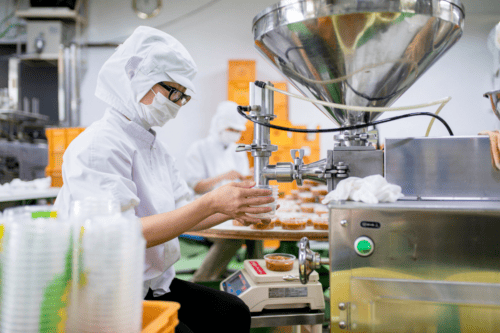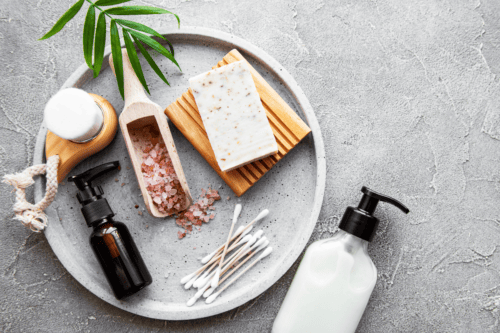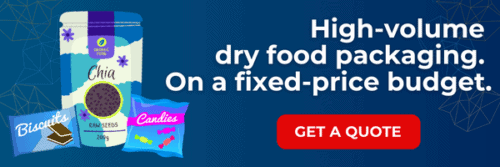 One of the most significant decisions for thriving business owners is private label vs. contract manufacturing.
One of the most significant decisions for thriving business owners is private label vs. contract manufacturing.
It’s important to understand the strengths and weaknesses of co-packing and private labeling to decide which option is best for your business, as the functions and benefits of the two vary greatly.
For the competitive food manufacturing industry, it’s essential to understand your options and rights regarding your products when working with third parties.
Co-Packaging (Contract Packaging)
One of the most straightforward explanations of co-packing, or contract packaging, is partnering with a facility to help take your product to the next level for effective mass production. With co-packaging, your product’s manufacturing and packaging are outsourced to a third party to streamline the production process and increase turnaround times. Some co-packers may help expand your product distribution network, packaging design, and product storage solutions. Companies can even provide their product recipes to co-packers and hire them to manufacture the products, which helps smaller companies get into a highly competitive space without making a considerable investment in their own production facilities.
Since you as the customer retain the rights to the proprietary formulation the co-packing manufacturer uses to create the product, there is typically a non-disclosure agreement between the parties that prevents the manufacturer from sharing information about formulations or creating any additional products outside the agreement.
Typical industries using co-packing include:
- Dry foods
- Supplement
- Cosmetics
- Health & wellness products
Private Label
 In simple terms, private label contract manufacturing is similar to a ghostwriter for mass-produced products. A private label manufacturer distributes their product and recipes under your brand. Therefore, as a customer, you do not own the rights to product formulation.
In simple terms, private label contract manufacturing is similar to a ghostwriter for mass-produced products. A private label manufacturer distributes their product and recipes under your brand. Therefore, as a customer, you do not own the rights to product formulation.
Private labeling is ideal for companies looking to expand into a new product niche or sell products without worrying about product development. Sometimes, a private label manufacturer will work exclusively with a single customer to produce a specific formulation or adjust a current formula for the customer’s private label. However, the private labeling facility retains ownership of the product formulation, process, and ingredients used to produce the product.
Typical uses of private labeling include:
- Health products
- Personal hygiene products
- Hair products
- Baby products
- Pet products
Which Method Should You Choose?
Choosing between co-packing and private label depends on your business goals, as the varying features between the two appeal to different business models. It is usually best to find a manufacturer who can do both to help you in either scenario as your business grows. To help you decide if co-packing or private labeling is suitable for mass producing your product, keep these considerations in mind:
Pricing
Since a private label manufacturer does everything from formulation to distribution, the pricing is likely higher than a co-packer who uses your product formulation to mass produce products with your pre-designed packaging.
Services Offered
- Co-packing offers more varied services, which can be as simple as packaging and distributing your product.
- Co-packing allows you to retain the rights to your product’s formula or proprietary processes.
- With a private label, you work with the facility to create a product that the manufacturer produces and packages on your behalf.
- Private labeling assists throughout the entire process from product development, branding, and packaging.
- Private labeling does not promise exclusivity.
Experience with Your Product
With both a co-packer and a private labeling manufacturer, it’s essential to consider the facility’s experience with your product type. Working with a specialist in your niche will ensure high-quality production and access to higher-level industry expertise.
Disadvantages of Private Labeling
- Dependant on a third-party manufacturer for product production.
- Harder to build brand loyalty when using a private label upon first entering a market.
- Consumers often associate private label products with being lower quality, even though it’s not always the case.
Econo-Pak: Experts in Packaging
Combining unmatched customer experience and a dedication to quality with state-of-the-art equipment and knowledgeable experts, Econo-Pak proudly creates product packaging and design services for businesses of all sizes.
Partner with Econo-Pak and let our family-owned packaging company help efficiently and effectively bring your product to market. We can handle scalable growth to meet your business’s needs, as no idea is too challenging for our team. Contact us to learn more about our innovative co-packaging services or request a quote to start your partnership with a top-rated co-packer.
